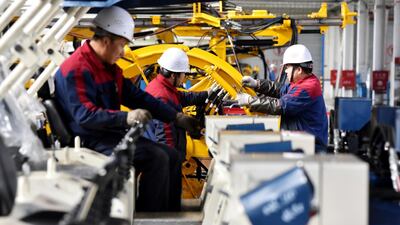The centre is on the move again, at last. Or at least, those who have in the past supported globalisation, free trade and multilateral co-operation, are regrouping and working out how to restore a middle ground that appears to have been comprehensively eroded in many western democracies.
This matters to those of us in the Middle East and other developing economies. Still mired in the consequences of the financial crisis, many western nations have been too busy dealing with their own economic challenges to pay much attention to anywhere else. These nations are our trade partners and our allies in terms of security. For too long, their politicians have been locked in a partisan blame game, as their nations have lurched from one crisis to another.
Now, the bankers, billionaires, chief executives, economists and analysts who were at the heart of the system – which was built by decades of almost unimpeded global growth, lifted millions out of poverty and expanded the boundaries of world power and influence eastwards and southwards − are finally realising that no one is coming to help them reclaim their place at the apex of the world order.
A decade ago, anti-globalisation forces were very much positioned on the left of the political spectrum. Now, groups and figures that oppose free trade and internationalism from the vantage point of the right hold the reins of power in countries ranging from Brazil and the United States to Italy and Hungary.
Those seeking to reclaim the political centre face a number of new challenges. Technological development is forcing a shift in jobs and skills and, perhaps most importantly, a few large companies hold all the cards when it comes to the collection and use of data. Meanwhile, the political forces that have emerged from the margins have done so, at least in part, by harnessing the potential of platforms such as Facebook and Twitter to reach out to disaffected voters.
The good news is that the more traditional private sector is taking steps to turn things around. Key to this strategy is reconnecting with those people who have been disenfranchised enough to have fallen prey to populist rhetoric.
In Singapore last week and in Dubai and Paris this week, there was clear evidence of this process. At the New Economy Forum, the World Economic Forum and the Peace Forum, the best and brightest minds from multinational corporations, NGOs, think thanks, energy producers, financial institutions, the media and tech companies gathered together. Many were all trying to figure out what a fairer, more inclusive − but also more open − world should look like.
The political scientist Ian Bremmer, for example, is leading a working group, as part of the New Economy Forum, to develop a new social contract for businesses. This contract will aim to define the role and social responsibilities of global companies and to ensure that all those affected by them – workers, consumers, suppliers and the markets in which they operate – are included in their growth. The group includes Dina Powell of Goldman Sachs, chairman of Mastercard Richard Haythornthwaite, and Arianna Huffington of Thrive Global.
At all of these forums, a number of similar initiatives are being worked upon. The areas covered range from urbanisation, trade, climate change and biodiversity to ethics surrounding the use of technology and capital markets.
Many of those who benefited most from globalisation have decided to stop pointing fingers about the ideology's recent failures and, instead, opted to work out where it goes from here. There is an acknowledgment that we still have a chance to change the model and offer a new vision for the future – one that ensures the widespread distribution of wealth and benefits that will result from changes in technology, and reverses the recent rise of nationalist and protectionist ideology.
What is so far missing from these much needed and long-overdue efforts to restore the economic and political centre is input from those who have, arguably, suffered most from globalisation: the working and middle classes of developed nations, who have lost many of the things they once took for granted, such as stable employment and opportunities for economic advancement.
That engagement, Mr Bremmer explained, is the next step in this process of renewal. First we have to create a framework for globalisation that offers something positive for ordinary people. The leaderships of emerging economies such as China and India, and those in the Arabian Gulf, which have benefited greatly from more open trade and business, are helping to formulate this new paradigm. They are participating in these forums and are pledging to make their own markets more open. Not only are they ready to support a new kind of globalisation, countries such as the UAE could even lead the charge in years to come.
Right now, we are at the very beginning of the road to a new and inclusive middle ground. But at least it’s a start. If trod carefully, it could eventually lead us to a place where wounds can heal and the world’s most intractable problems can be dealt with, once and for all.
Mustafa Alrawi is an assistant editor in chief at The National


